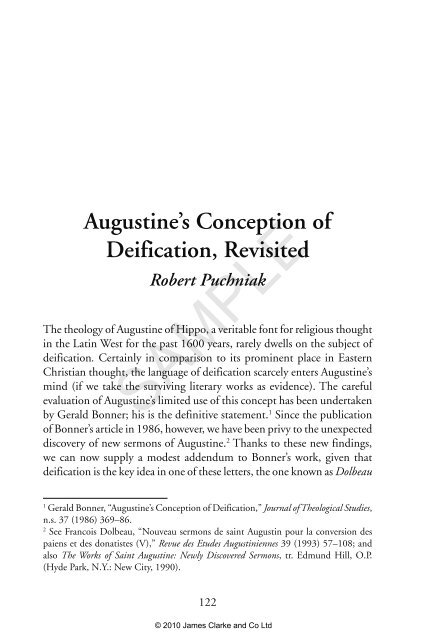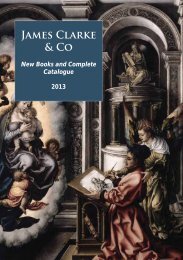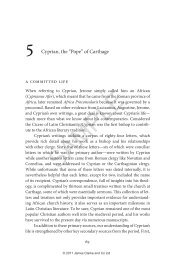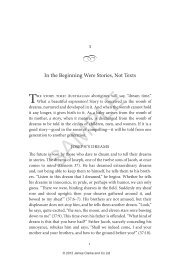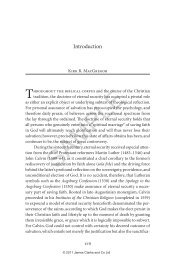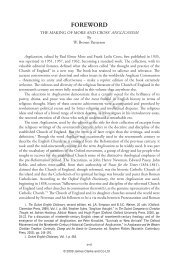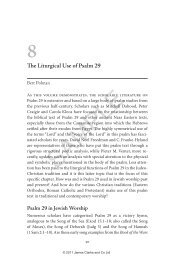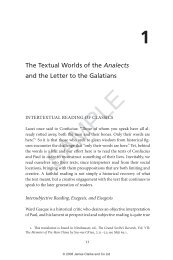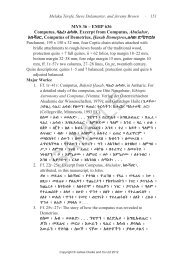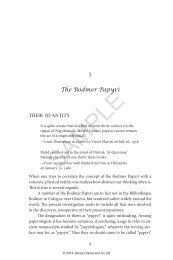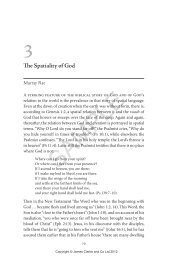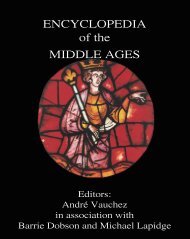Augustine's Conception of Deification, Revisited - James Clarke and ...
Augustine's Conception of Deification, Revisited - James Clarke and ...
Augustine's Conception of Deification, Revisited - James Clarke and ...
You also want an ePaper? Increase the reach of your titles
YUMPU automatically turns print PDFs into web optimized ePapers that Google loves.
Augustine’s <strong>Conception</strong> <strong>of</strong><br />
<strong>Deification</strong>, <strong>Revisited</strong><br />
Robert Puchniak<br />
The theology <strong>of</strong> Augustine <strong>of</strong> Hippo, a veritable font for religious thought<br />
in the Latin West for the past 1600 years, rarely dwells on the subject <strong>of</strong><br />
deification. Certainly in comparison to its prominent place in Eastern<br />
Christian thought, the language <strong>of</strong> deification scarcely enters Augustine’s<br />
mind (if we take the surviving literary works as evidence). The careful<br />
evaluation <strong>of</strong> Augustine’s limited use <strong>of</strong> this concept has been undertaken<br />
by Gerald Bonner; his is the definitive statement. 1 Since the publication<br />
<strong>of</strong> Bonner’s article in 1986, however, we have been privy to the unexpected<br />
discovery <strong>of</strong> new sermons <strong>of</strong> Augustine. 2 Thanks to these new findings,<br />
we can now supply a modest addendum to Bonner’s work, given that<br />
deification is the key idea in one <strong>of</strong> these letters, the one known as Dolbeau<br />
SAMPLE<br />
1<br />
Gerald Bonner, “Augustine’s <strong>Conception</strong> <strong>of</strong> <strong>Deification</strong>,” Journal <strong>of</strong> Theological Studies,<br />
n.s. 37 (1986) 369–86.<br />
2<br />
See Francois Dolbeau, “Nouveau sermons de saint Augustin pour la conversion des<br />
paiens et des donatistes (V),” Revue des Etudes Augustiniennes 39 (1993) 57–108; <strong>and</strong><br />
also The Works <strong>of</strong> Saint Augustine: Newly Discovered Sermons, tr. Edmund Hill, O.P.<br />
(Hyde Park, N.Y.: New City, 1990).<br />
122<br />
© 2010 <strong>James</strong> <strong>Clarke</strong> <strong>and</strong> Co Ltd
Augustine’s <strong>Conception</strong> <strong>of</strong> <strong>Deification</strong>, <strong>Revisited</strong><br />
6 or Mainz 13. Augustine supplies an extended meditation in Dolbeau 6<br />
on a subject so seldom mentioned elsewhere. In what is a homiletic<br />
exposition <strong>of</strong> Psalm 81, he gives voice to a rich theological anthropology.<br />
In so doing, he connects the concept <strong>of</strong> a “deifying God” (deificatorem<br />
deum) to the soul’s spiritual warfare, the biblical vision <strong>of</strong> salvation history,<br />
<strong>and</strong> the gathering <strong>of</strong> members <strong>of</strong> the ecclesial “Body <strong>of</strong> Christ.”<br />
The Principal Passages<br />
Bonner cites only fifteen examples <strong>of</strong> the words DEIFICARI <strong>and</strong> DEIFICATUS<br />
(<strong>and</strong> seven <strong>of</strong> these, he argues, are “irrelevant” to the theology <strong>of</strong><br />
deification). Among the “relevant” passages he includes:<br />
Ep. 10.2: Augustine laments to his close childhood friend, Nebridius,<br />
that “amid uproar <strong>and</strong> restless comings <strong>and</strong> goings” a person cannot<br />
“achieve the familiarity with death that we are seeking. For in leisure . . .<br />
[one] would be permitted to become godlike” [in contemplation]. 3 This<br />
letter, written ca. 388–91, dates to the period after his conversion <strong>and</strong><br />
baptism, but before his ordination as a priest in Hippo. An echo <strong>of</strong> the<br />
youthful Augustine’s Neoplatonic yearning for the fulfillment <strong>of</strong> the<br />
philosophical life can be heard here.<br />
Enarrat. In Ps. 49.2: Here we find multiple references clustered<br />
together: (i) In reference to Psalm 81, he says, “It is quite obvious that<br />
God called human beings “gods” in the sense that they were deified by his<br />
grace, 4 not because they were born <strong>of</strong> his own substance.” (ii) “. . . . He<br />
alone deifies who is God <strong>of</strong> himself, not by participation in any other.” 5<br />
(iii) “Moreover he who justifies is the same as he who deifies, because by<br />
justifying us he made us sons <strong>and</strong> daughters <strong>of</strong> God . . .” (iv) “If we have<br />
been made children <strong>of</strong> God, we have been made into gods; but we are<br />
such by the grace <strong>of</strong> him who adopts us.” 6 This enarratio (explanation)<br />
SAMPLE<br />
3<br />
Letters 1–99. The Works <strong>of</strong> Saint Augustine: A Translation for the 21st Century, vol. II/1,<br />
tr. Rol<strong>and</strong> Teske, S.J. (Hyde Park, N.Y.: New City, 2001) 34.<br />
4<br />
My italics.<br />
5<br />
Bonner, “Augustine’s <strong>Conception</strong>,” 384.<br />
6<br />
Expositions <strong>of</strong> the Psalms (33–50). The Works <strong>of</strong> Saint Augustine (same series), vol. III/<br />
16, tr. Maria Boulding, O.S.B. (Hyde Park, N.Y.: New City, 2000) 381.<br />
123<br />
© 2010 <strong>James</strong> <strong>Clarke</strong> <strong>and</strong> Co Ltd
Theo4sis<br />
exhibits special affinity with our sermon in question, Dolbeau 6; the use<br />
<strong>of</strong> deificatio is sustained <strong>and</strong> is applied to the Christian mysteries.<br />
Enarrat. in Ps. 117.11: Commenting on “The Lord’s right h<strong>and</strong> has<br />
proved its might,” Augustine writes, “Great might is needed to raise up<br />
the lowly, to deify a mere mortal, to make the weak perfect, to grant glory<br />
through abasement <strong>and</strong> victory through suffering.” 7<br />
Serm. 126.14: “And there he stood, in front <strong>of</strong> the eyes <strong>of</strong> a servant,<br />
in the form <strong>of</strong> a servant, saving the form <strong>of</strong> God for deified eyes, <strong>and</strong> he<br />
said to him, Am I with you all this time, <strong>and</strong> you do not know me?” 8 (dated<br />
to 417 AD).<br />
Serm. 166.4: “God, you see, wants to make you a god; not by nature,<br />
<strong>of</strong> course, like the one whom he begot; but by his gift <strong>and</strong> by adoption” 9<br />
(dated to after 410 AD).<br />
From the limited evidence, Bonner drew several astute conclusions:<br />
(1) Augustine “believed his teaching on deification was based on<br />
Scripture” 10 <strong>and</strong> he rejected the Plotinian idea that deification could be<br />
achieved by the independent efforts <strong>of</strong> a philosopher, unaided by grace;<br />
deification was possible only “from a participation in God made possible<br />
by divine initiative.” 11<br />
(2) The “christocentricity” <strong>of</strong> Augustine’s thought was integrated into<br />
his underst<strong>and</strong>ing <strong>of</strong> deification; Augustine says clearly that “adoption by<br />
grace” is impossible without the mediation <strong>of</strong> the God-man. Augustine<br />
does, like the Greek Fathers, use the language <strong>of</strong> “participation” in God, 12<br />
<strong>and</strong> he was in agreement with the theologies <strong>of</strong> both Irenaeus <strong>and</strong><br />
Athanasius 13 (Bonner cites Serm. 192.1: “To make gods those who were<br />
men, He was made man who is God”).<br />
SAMPLE<br />
7<br />
Expositions <strong>of</strong> the Psalms (99–120). The Works, vol. III/19, tr. Maria Boulding (2003)<br />
337.<br />
8<br />
Sermons (94A–147A) On The New Testament. The Works, vol. III/4, tr. Edmund Hill,<br />
O.P. (1992) 278.<br />
9<br />
Sermons (148–183) On The New Testament. The Works, vol. III/5, tr. Edmund Hill<br />
(1992) 209.<br />
10<br />
Bonner, “Augustine’s <strong>Conception</strong>,” 371.<br />
11<br />
Ibid., 372.<br />
12<br />
Ibid., 373–74.<br />
13<br />
Ibid., 376.<br />
124<br />
© 2010 <strong>James</strong> <strong>Clarke</strong> <strong>and</strong> Co Ltd
Augustine’s <strong>Conception</strong> <strong>of</strong> <strong>Deification</strong>, <strong>Revisited</strong><br />
(3) Augustine’s underst<strong>and</strong>ing <strong>of</strong> the unity <strong>of</strong> Christ <strong>and</strong> His church<br />
is closely associated with his use <strong>of</strong> deification: the elevation <strong>of</strong> humanity<br />
as adopted sons <strong>and</strong> daughters involves not only individual believers, but<br />
the whole church. 14 Moreover, deification is, in Augustine’s thought, “a<br />
state which will be attained only in the life to come.” There can be no<br />
claims to final perfection in this life; deification in its fullness is<br />
eschatological.<br />
(4) Though the use <strong>of</strong> the term, deificatio, is scarce, “Augustine was<br />
apparently prepared to equate justification <strong>and</strong> deification, regarding both<br />
as the consequence <strong>of</strong> man’s adoption.” Bonner refers to the same Enarrat.<br />
In Ps. 49, cited above: “For He justifies, who is just <strong>of</strong> Himself <strong>and</strong> not <strong>of</strong><br />
another; <strong>and</strong> He deifies, who is God <strong>of</strong> Himself <strong>and</strong> not by participation<br />
in another. Now He who justifies, Himself deifies, because by justifying<br />
He makes sons <strong>of</strong> God.”<br />
(5) Further, Bonner argues that deification is a matter for consideration<br />
within “dogmatic” theology rather than “contemplative” theology, because<br />
“it describes the consequences <strong>of</strong> the saving work <strong>of</strong> Christ rather than a<br />
mystical state enjoyed by a contemplative.” In response to this assertion,<br />
one may reasonably question, however, whether such a distinction between<br />
“dogmatic” <strong>and</strong> “contemplative” types <strong>of</strong> theology would have been made<br />
by Augustine himself. It can be argued, moreover, that when Augustine<br />
spoke, in either catechetical or polemical tones, his threefold aim was to<br />
teach, to persuade <strong>and</strong> to delight (<strong>and</strong> the first <strong>of</strong> these was paramount).<br />
All <strong>of</strong> his work he wished to be edifying, for his teaching “with the help <strong>of</strong><br />
the divine testimonies” aimed to “induce belief” by garnering obedience<br />
to their authority. 15 The delineation between dogmatic <strong>and</strong> contemplative<br />
tasks is ours, <strong>and</strong> not Augustine’s. For him, all theology ought to be both<br />
dogmatic (ins<strong>of</strong>ar as it is sound in its articulation) <strong>and</strong> contemplative<br />
(ins<strong>of</strong>ar as it coaxes the deepening <strong>of</strong> faith).<br />
Bonner’s underst<strong>and</strong>ing <strong>of</strong> deification in Augustine’s thought does<br />
indeed ring true in light <strong>of</strong> our “new” sermon <strong>of</strong> Augustine. Dolbeau 6 has<br />
for its focus Psalm 81: “God has stood up in the synagogue <strong>of</strong> gods,” <strong>and</strong><br />
it begins with a remarkably dense catechetical passage (6.1) on the dynamics<br />
SAMPLE<br />
14<br />
Ibid., 375–76.<br />
15<br />
On Christian Teaching, IV.146; tr. R. P. H. Green (Oxford: Oxford University Press,<br />
1997).<br />
125<br />
© 2010 <strong>James</strong> <strong>Clarke</strong> <strong>and</strong> Co Ltd
Theo4sis<br />
<strong>of</strong> deification. “We carry mortality about with us, we endure infirmity,<br />
we look forward to divinity. For God wishes not only to vivify, but also to<br />
deify us.” (Gerimus mortalitatem, toleramus infirmitatem, exspectamus<br />
diuinitatem. Vult enim deus non solum uiuificare, sed etiam deificare nos.)<br />
Augustine reassures his audience that it is “God’s promise” that persons<br />
will be made gods. In true Athanasian fashion, he repeats the age-old<br />
axiom <strong>of</strong> Christian hope: “The Son <strong>of</strong> God became a son <strong>of</strong> man, in order<br />
to make sons <strong>of</strong> men into sons <strong>of</strong> God.” (Filius dei factus est filius hominis,<br />
ut filios hominum faceret filios dei.) Augustine tells <strong>of</strong> a forward-looking<br />
vision: what has begun with the incarnation will be completed in the<br />
future, will be made manifest at a definite time (certo tempore apparebit).<br />
The promise <strong>of</strong> God is that He will make human persons “gods not by<br />
nature but by adoption, by grace.” The “true God,” he proclaims, is a<br />
“deifying God” (deificatorem deum), a “god-making God” (deificum deum).<br />
There is abundant optimism in this opening section, wherein<br />
Augustine accentuates the end <strong>and</strong> goal <strong>of</strong> Christian hope.<br />
Augustinian Polemic<br />
On this day, however, we find Augustine in a fighting mood. His catechesis<br />
<strong>and</strong> spiritual guidance were laced with polemical concern. He set the stage<br />
for an argument with his initial comments: the gods that are made by the<br />
h<strong>and</strong> <strong>of</strong> a craftsman are not like the gods made by the “true” God. “Our<br />
God,” he says, makes us into gods, but “they worship gods they make” (Vos<br />
adoratis deum, qui uos facit deos; illi autem adorant deos, quos faciendo et<br />
ador<strong>and</strong>o perdunt ut ipsi dii fiant), thus criticizing pagan practices <strong>of</strong> idol<br />
worship, which must have been, given his attention to the matter, still very<br />
prevalent in the North Africa <strong>of</strong> 404, when this sermon was delivered. 16<br />
SAMPLE<br />
16<br />
Francois Dolbeau has argued, regarding the circumstances <strong>of</strong> the delivery <strong>of</strong> this sermon,<br />
for the likelihood that Augustine was not in a rural township but in a town or city where<br />
some people in his audience understood Greek (see para. 2). He further places the sermon,<br />
along with Mainz 12, in Carthage in the winter <strong>of</strong> 403–404. Augustine was engaged in<br />
an ongoing refutation <strong>of</strong> the pagan religious practices alive in North Africa, a region that<br />
had received many lavish imperial monuments to the gods, dating back to the Severan<br />
dynasty. But now, legal interdiction against the pagan cults, which took force in the late<br />
fourth century, was blamed for the multiplication <strong>of</strong> civil troubles <strong>and</strong> for natural<br />
126<br />
© 2010 <strong>James</strong> <strong>Clarke</strong> <strong>and</strong> Co Ltd
Augustine’s <strong>Conception</strong> <strong>of</strong> <strong>Deification</strong>, <strong>Revisited</strong><br />
When one worships the product <strong>of</strong> one’s own h<strong>and</strong>, he warns, one loses the<br />
chance to become a god; the crafting <strong>of</strong> idols amounts to a “falling away”<br />
<strong>and</strong> lost opportunity (6.3).<br />
Augustine asks, so what do people want: to become gods, or to make<br />
gods? (Quid ergo uolunt homines: dii fieri, an deos facere?) (6.3). One can<br />
sense the word play <strong>of</strong> a master rhetorician coming to the fore. He calls<br />
upon his audience to worship not “what you have made” but instead “the<br />
one who made you.” The “godless” fashion an image “<strong>and</strong> slap a name on<br />
it” (imponere illi nomen). He makes an appeal to the self-respect <strong>of</strong> those<br />
in the crowd: “It is an insult to you (iniuria tibi est) that you should be<br />
like the one you have made” (6.5). The creation <strong>of</strong> the human person as<br />
imago Dei bestows dignity on all individuals. That someone would hope<br />
to be like an idol should arouse an indignant response, he insists. Why?<br />
Because an idol cannot do justice to the depth <strong>of</strong> “your inner self”<br />
(interiorem hominem tuum). Augustine calls upon people to use their<br />
intelligence “to see the truth” (uis uidere ueritatem). The inner self, he tells<br />
them, was bestowed with “all the senses,” <strong>and</strong> these ought to be used to<br />
recognize the dignity <strong>of</strong> the human person, not to “become like the<br />
caricature, the idol” (simulacro).<br />
If the inner self becomes somehow or other insensitive, stupid, he<br />
becomes in a certain manner like an idol, <strong>and</strong> having ruined in himself<br />
the image <strong>of</strong> the one by whom he was made, he wishes to take on the<br />
image <strong>of</strong> the one which he has made [si fiat insensatus quodammodo<br />
homo interior, fit ad quendam modum similis simulacro et, perdita in se<br />
imagine eius a quo factus est, eius quem fecit uult capere imaginem]. (6.5) 17<br />
SAMPLE<br />
catastrophes. Pagan complaints during the ‘tempora christiana’ abounded. Amidst the<br />
provocation <strong>and</strong> counter-provocation, we find Augustine appealing to unusual language,<br />
“un terme inhabituel,” as Dolbeau says, deificatio (Revue des Etudes Augustiniennes, 39<br />
[1993] 57–108).<br />
17<br />
Would some <strong>of</strong> the people in his audience be familiar with Augustine’s own story <strong>of</strong><br />
how he had long sullied the image <strong>of</strong> the one who made him? It had been six years or<br />
more since the writing <strong>of</strong> his Confessions. Augustine had admitted that he remained<br />
‘ignorant’ <strong>of</strong> what it meant to be created in God’s image, <strong>and</strong> that he even ‘insulted <strong>and</strong><br />
opposed’ the idea, being ‘deceived with promises <strong>of</strong> certainty’ by the Manichees as well<br />
as his own ‘childish error <strong>and</strong> rashness’ (Confessions, VI.iv [5], trans. Henry Chadwick<br />
[Oxford: Oxford University Press, 1991]).<br />
127<br />
© 2010 <strong>James</strong> <strong>Clarke</strong> <strong>and</strong> Co Ltd
Theo4sis<br />
With the aid <strong>of</strong> the “spirit <strong>of</strong> God,” he continues, it is possible to<br />
discern properly, <strong>and</strong> to see one’s unlikeness to the simulacrum <strong>of</strong> the<br />
idol. He laments those who lack such discernment, but their lack <strong>of</strong><br />
discernment, he reassures, is no loss <strong>of</strong> “God’s work in themselves,” which<br />
can never be killed (6.7). Augustine further chides those who trust in the<br />
impotency <strong>of</strong> idols, <strong>and</strong> he warns <strong>of</strong> the power <strong>of</strong> “our God” to cast demon<br />
worshippers “into the eternal fire” (6.9). (He equates the numina <strong>of</strong> the<br />
idols with demons.) He cautions his audience against the temptation to<br />
seek counsel from diviners or soothsayers (6.10). He equates such<br />
superstitious action with “seeking the society <strong>of</strong> demons” (socius<br />
daemoniorum) <strong>and</strong> the forfeiture <strong>of</strong> a divine inheritance as an “associate <strong>of</strong><br />
Christ” (socius Christi). Those who heard him, he assumes, were “under<br />
enormous pressures” (6.11), affected by illness <strong>and</strong> strife, <strong>and</strong> thus<br />
vulnerable to the balm <strong>of</strong> the diviners. Augustine, as bishop, appears keenly<br />
aware <strong>of</strong> the quoditian tribulations <strong>of</strong> the parvuli (little ones), whose faith<br />
he cared for.<br />
After this excursus into condemning idolatry, he returns to the matter<br />
<strong>of</strong> deification. He reminds his listeners that Christians were not called to<br />
lives <strong>of</strong> comfort <strong>and</strong> luxury, <strong>and</strong> that they must endure their hardships<br />
(ferto condicionem tuam). Such suffering is part <strong>and</strong> parcel <strong>of</strong> life after the<br />
Fall: “Indeed, it was our very nature that first sinned, <strong>and</strong> we derive from<br />
there what we are born with” (6.11) (Etenim ipsa natura nostra prima<br />
peccauit, et ducimus inde quod nascimur). The endurance <strong>of</strong> suffering will<br />
lead to the immortal possession <strong>of</strong> deification, he assures. The divine<br />
initiative is directed at sufferers who will be “recreated” into blessed<br />
immortals (Dicit creator: “Recreabo uos” ). <strong>Deification</strong> does not occur in<br />
the isolated peace <strong>of</strong> the quiet, contemplative life, or in the seclusion <strong>of</strong><br />
retreat, but rather it begins in the “craftsman’s furnace” (fornax artificis),<br />
in this “world full <strong>of</strong> sc<strong>and</strong>als, iniquities, corruption, oppression” (6.12).<br />
He tells his flock that they find themselves in the age <strong>of</strong> the “oil press” <strong>and</strong><br />
the screws are being tightened so as to separate the oil from the dregs<br />
(6.15). He speaks not to a spiritual elite who have chosen Mary’s “better<br />
part,” but instead to many Martha’s who cannot but help find themselves<br />
engaged in worldly toil.<br />
This sermon, Dolbeau 6, <strong>of</strong>fers us a concrete example <strong>of</strong> Augustine<br />
the theologian translating core ideas <strong>of</strong> more detailed <strong>and</strong> targeted doctrinal<br />
works into the pastoral concerns <strong>of</strong> Augustine the bishop. In appealing to<br />
SAMPLE<br />
128<br />
© 2010 <strong>James</strong> <strong>Clarke</strong> <strong>and</strong> Co Ltd
Augustine’s <strong>Conception</strong> <strong>of</strong> <strong>Deification</strong>, <strong>Revisited</strong><br />
the inherent dignity <strong>of</strong> persons created in the image <strong>of</strong> God, Augustine<br />
echoes some <strong>of</strong> the concerns <strong>of</strong> The Trinity, which he had begun in 400<br />
<strong>and</strong> would not complete until 416, thus placing Dolbeau 6 (dated to 404)<br />
in the midst <strong>of</strong> his meditations on the three Persons <strong>of</strong> the Godhead. In<br />
The Trinity, he implores his reader: “With the example <strong>of</strong> the Image [Christ]<br />
before us, let us also not depart from God. For we are, likewise, the image<br />
<strong>of</strong> God, not indeed an equal image, since it was made by the Father through<br />
the Son, not born <strong>of</strong> the Father as that is” (VII.3.5). 18 (Hence Augustine’s<br />
distinction in Dolbeau 6 that one is made a “son <strong>of</strong> God” not in substance<br />
or by nature, but rather by grace.) The human person is an image <strong>of</strong> the<br />
Image, <strong>and</strong> is called to imitate the Image by “striving.” Further, he writes,<br />
“For the true honor <strong>of</strong> man is to be the image <strong>and</strong> the likeness <strong>of</strong> God<br />
which is preserved only in relation to Him by whom it is impressed”<br />
(XII.11.16). Contrariwise, man’s “likeness to the beasts is his disgrace”<br />
(XII.11.16). The best possession <strong>of</strong> the immortal soul is the “image <strong>of</strong><br />
God its Creator,” something that will not cease to be (XIV.2.4). We look<br />
into a mirror to see an image, he writes, <strong>and</strong> by looking through our own<br />
image we may catch a glimpse <strong>of</strong> “Him by whom we have been made.”<br />
Augustine cites 2 Cor 3.18: “But we, with face unveiled, beholding the<br />
glory <strong>of</strong> God, are transformed into the same image . . . ” Human persons,<br />
as the imago Dei, share in God’s glory (XV. 8.14). Being the image <strong>of</strong> the<br />
blessed Trinity, human persons are endowed with memory, underst<strong>and</strong>ing,<br />
<strong>and</strong> will, which are themselves intended for remembering, seeing, <strong>and</strong><br />
loving God (XV.20.39). In Dolbeau 6, Augustine is especially keen on<br />
insisting that the sacred image <strong>of</strong> God within the human person not be<br />
defiled by the worship <strong>of</strong> corrupt idols. That which is worshipped ought<br />
to glorify <strong>and</strong> not debase the image <strong>of</strong> God within. The intimate<br />
relationship between worship <strong>and</strong> theological anthropology seems never<br />
far from Augustine’s mind, as he implores his audience to remember their<br />
created dignity.<br />
Many <strong>of</strong> the above theological ruminations were made audible in the<br />
living church addressed by Augustine in 404. The concerns voiced in<br />
Dolbeau 6 fit a particular historical context; they reveal Augustine engaged<br />
in battle, yet again. As Peter Brown has remarked, in a new addition to his<br />
SAMPLE<br />
18<br />
The Trinity, tr. Stephen McKenna, C.S.S.R. (Washington: Catholic University <strong>of</strong><br />
America Press, 1963).<br />
129<br />
© 2010 <strong>James</strong> <strong>Clarke</strong> <strong>and</strong> Co Ltd
Theo4sis<br />
classic work, Augustine <strong>of</strong> Hippo: A Biography, we find “an Augustine [in<br />
404] struggling with all the rhetorical <strong>and</strong> didactic resources at his disposal<br />
to keep the Christian congregation from being absorbed back into a world<br />
in which Christianity had by no means yet captured the cultural high<br />
ground.” 19 The “triumph” <strong>of</strong> Christianity was in no way complete at this<br />
point in North Africa’s history. Another sermon from earlier in the same<br />
year (Dolbeau 198; Mainz 62), delivered on the Kalends feast <strong>of</strong> January<br />
1, 404, serves to illustrate this point <strong>and</strong> merits brief comparison, given<br />
its many common themes. Augustine faced his audience then on the<br />
“festival <strong>of</strong> the nations,” when people indulged in “the joys <strong>of</strong> the world<br />
<strong>and</strong> the flesh, with the din <strong>of</strong> silly <strong>and</strong> disgraceful songs” (198.1). He<br />
warned that mixing with non-Christians was “not safe <strong>and</strong> sound” (198.2),<br />
if it led to the corruption <strong>of</strong> virtue: “Are you going to join today in the<br />
celebration <strong>of</strong> good luck presents [on the feast <strong>of</strong> Fortuna] with a pagan,<br />
going to play at dice with a pagan, going to get drunk with a pagan?”<br />
(198.2) Augustine called upon his people instead to fast, as they wrestled<br />
(he would hope) with their consciences. He knew there was great<br />
temptation for Christians to join in the “frivolities,” “extravagant pleasures,”<br />
“unrestrained drunkenness,” <strong>and</strong> gambling—it was a time <strong>of</strong> great excess<br />
(198.8). Augustine was aware that engaging in such activity was morally<br />
reprehensible, <strong>and</strong> further, defiled one’s interior life. He urged people to<br />
protect the “temple <strong>of</strong> prayer” which is the heart; to keep one’s “inner<br />
room” guarded against “bodily allurements” (198.1). 20 It is curious,<br />
SAMPLE<br />
19<br />
Peter Brown, Augustine <strong>of</strong> Hippo: A Biography, new ed. (London: Faber <strong>and</strong> Faber,<br />
2000) 457. Brown adds, “The sermons preached by Augustine in 404 were nothing less<br />
than a series <strong>of</strong> master classes on the nature <strong>of</strong> true relations between God <strong>and</strong> man”<br />
(458).<br />
20<br />
Regarding the veneration <strong>of</strong> idols (a subject closely associated with an inability to<br />
discern the image <strong>of</strong> God in humanity <strong>and</strong> the Christian hope <strong>of</strong> deification), Augustine’s<br />
problem was not merely that Christians had bowed down to pagan idols, but also that<br />
Christians had engaged in unacceptable “adoration <strong>of</strong> columns or the stones <strong>of</strong> buildings<br />
in holy places, or even <strong>of</strong> pictures” in their own churches (Serm. 198.16). Some ‘educated<br />
pagans’ had, it seems, begun to challenge Christians who criticized their (pagan) image<br />
veneration—Christians too were venerating icons <strong>and</strong> physical holy places. Augustine<br />
was at pains to clarify that what ought to be worshipped is not the thing itself, but what<br />
it signifies. He wanted Christians to search for the image <strong>of</strong> the divine craftsman with<br />
the eyes <strong>of</strong> the mind (198.31), though the mind itself, wrapped up in sin, “st<strong>and</strong>s in<br />
need <strong>of</strong> purification” (198.37).<br />
130<br />
© 2010 <strong>James</strong> <strong>Clarke</strong> <strong>and</strong> Co Ltd
Augustine’s <strong>Conception</strong> <strong>of</strong> <strong>Deification</strong>, <strong>Revisited</strong><br />
however, that while Augustine’s preoccupation during the Kalends festival<br />
was with the spiritual dangers <strong>of</strong> paganism, he did not elect to incorporate<br />
the “deificatio” logic <strong>of</strong> Dolbeau 6.<br />
Infrequency <strong>of</strong> <strong>Deification</strong> Imagery<br />
It is worth asking why Augustine so rarely turned to the use <strong>of</strong> the concept<br />
<strong>of</strong> deification. One clue to an answer may be found in his “magnum<br />
opus,” The City <strong>of</strong> God, wherein deification is discussed in its pagan context,<br />
<strong>and</strong> with unfavorable criticism. Here Augustine voices his intense<br />
displeasure with the practice <strong>of</strong> deifying—<strong>and</strong> then worshiping—men;<br />
one such example being that <strong>of</strong> Diomede, who was turned into a god<br />
after being credited with founding various towns <strong>and</strong> spreading Greek<br />
culture into Italy. 21 This sort <strong>of</strong> deification is a deception, Augustine argued,<br />
<strong>and</strong> amounts to the worship <strong>of</strong> false gods. In so doing, the “living God” is<br />
neglected; “temples, altars, sacrifices <strong>and</strong> priests” become devoted to “dead<br />
men” (XVIII.18) instead <strong>of</strong> their rightful recipient. One cannot escape<br />
from “the city <strong>of</strong> this world” <strong>and</strong> advance in faith, he warns, if one is<br />
captive to the practices <strong>of</strong> “Babylon.” Given the eagerness <strong>of</strong> the ancient<br />
Greeks <strong>and</strong> Romans to deify <strong>and</strong> worship their own, we can suppose that<br />
Augustine was especially cautious in using the language <strong>of</strong> deification in<br />
the Christian church, lest he mislead some into imagining that Christians<br />
themselves become equals <strong>of</strong> God Almighty. Moreover, Augustine was<br />
always wary to state unambiguously that the deified faithful do not become<br />
“God by nature” but rather “gods by grace.” Augustine achieves in Dolbeau<br />
6 a remarkable homiletic move: he can, on the one h<strong>and</strong>, deconstruct the<br />
pagan use <strong>of</strong> idols <strong>and</strong>, on the other, provide his own congregants food<br />
for thought on the interior life <strong>of</strong> the soul.<br />
Henry Chadwick, in his comments on the newly discovered sermons,<br />
has remarked, “two themes appear to be recurrent [in these sermons <strong>of</strong><br />
404]. The first is that true religion is inward <strong>and</strong> a matter <strong>of</strong> the heart . . . A<br />
second prominent theme is that true faith will issue in a reformed moral<br />
life.” 22 Augustine was first <strong>and</strong> foremost a bishop, a teacher <strong>and</strong> caretaker<br />
SAMPLE<br />
21<br />
The City <strong>of</strong> God, XVIII.16ff.<br />
22<br />
“New Sermons <strong>of</strong> Augustine,” Journal <strong>of</strong> Theological Studies, n.s. 47 (1996) 69–91.<br />
131<br />
© 2010 <strong>James</strong> <strong>Clarke</strong> <strong>and</strong> Co Ltd
Theo4sis<br />
<strong>of</strong> souls, who would consistently remind those in his care <strong>of</strong> the l<strong>of</strong>tiest<br />
aspirations, for adoption by the h<strong>and</strong> <strong>of</strong> the divine architect, which, he<br />
would also declare, is not fully knowable in the present life for human<br />
persons tainted by sin. He spoke instead <strong>of</strong> the possibilities <strong>of</strong> human life,<br />
while not forgetting the present human condition <strong>of</strong> alienation from God. 23<br />
As a champion <strong>of</strong> a theological view that wholly rejected the immodest<br />
Pelagian confidence in human ability to achieve perfection in this life,<br />
Augustine was loathe to overemphasize human striving independent <strong>of</strong><br />
divine assistance; deification was not an accomplishment but a gift. All<br />
mention <strong>of</strong> deification in Dolbeau 6 is careful to underscore God’s<br />
providential action: the divine agent acts upon the human recipient, <strong>and</strong><br />
does so within the protective confines <strong>of</strong> the church. The faithful together<br />
await, with restless longing, the consummation <strong>of</strong> history which finds the<br />
members <strong>of</strong> the “body <strong>of</strong> Christ” transfigured into “gods.” Augustine<br />
reminded people that deification was a divinely granted possibility, ecclesial<br />
in its dimensions, <strong>and</strong> the telos <strong>of</strong> present aspirations.<br />
Lastly, it is essential to be reminded that the proper location for the<br />
language <strong>of</strong> deification was the sacramental life <strong>of</strong> the church community.<br />
It is no mistake that we find Augustine delivering the message <strong>of</strong> deification<br />
within a liturgical setting. He did not underst<strong>and</strong> the transfiguration <strong>of</strong><br />
humanity into “gods” to be a private affair. The piety <strong>of</strong> every individual<br />
was, Augustine believed, nurtured within the “cultus,” within sacred<br />
liturgical celebrations. 24 The community was bonded together by the<br />
sacraments <strong>and</strong> unifying participation was most <strong>of</strong>ten felt in the shared<br />
Eucharist—itself a constant reminder <strong>of</strong> the Christian mysteries, <strong>of</strong> God’s<br />
active presence in their midst, working a transformation among them.<br />
Augustine, as spiritual father, sought to communicate an underst<strong>and</strong>ing<br />
that “our present passage from death to life, which takes place through<br />
faith, is accomplished in the hope <strong>of</strong> the future resurrection <strong>and</strong> glory in<br />
the end.” 25 A foretaste <strong>of</strong> the eschatological deification was <strong>of</strong>fered in <strong>and</strong><br />
SAMPLE<br />
23<br />
On the subject <strong>of</strong> Augustine communicating ‘possibilities,’ see Eugene TeSelle, Augustine<br />
the Theologian (New York: Herder <strong>and</strong> Herder, 1970) 68.<br />
24<br />
See Frederick Van der Meer’s classic work, Augustine the Bishop: Church <strong>and</strong> Society at<br />
the Dawn <strong>of</strong> the Middle Ages, trans. Brain Battershaw <strong>and</strong> G. R. Lamb (New York: Harper,<br />
1961) 277ff.<br />
25<br />
Ep. 55, trans. Rol<strong>and</strong> Teske, S. J., in The Works <strong>of</strong> Saint Augustine: Letters 1–99, vol. II/<br />
1 (Hyde Park, N.Y.: New City, 2001).<br />
132<br />
© 2010 <strong>James</strong> <strong>Clarke</strong> <strong>and</strong> Co Ltd
Augustine’s <strong>Conception</strong> <strong>of</strong> <strong>Deification</strong>, <strong>Revisited</strong><br />
through the church’s sacramental life. Only there could one find a haven<br />
against the many snares that populated Augustine’s spiritual imagination. 26<br />
SAMPLE<br />
26<br />
A debt <strong>of</strong> gratitude is owed to Rev. Gabriel Coless, O.S.B. for his illuminating remarks<br />
<strong>of</strong>fered in response to early drafts <strong>of</strong> this work.<br />
133<br />
© 2010 <strong>James</strong> <strong>Clarke</strong> <strong>and</strong> Co Ltd


